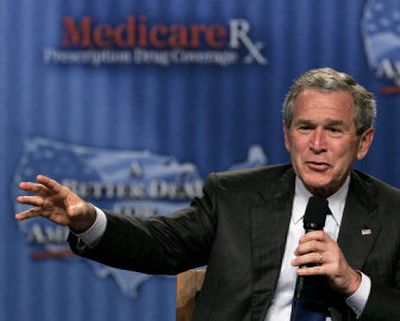Medicare drug plan passes muster with users

WASHINGTON – Millions of senior citizens have not signed up for and do not know much about Medicare’s new prescription drug benefit, but among those who have enrolled, three-quarters said the paperwork was easy to complete and nearly two-thirds said the program saved them money, the latest Washington Post-ABC News poll shows.
The findings underscore the challenge the administration faces in persuading large numbers of seniors to participate in and support the program, the largest expansion of a government social benefit in decades. But it also unmasks a political opportunity among older voters for President Bush and the Republicans if they succeed.
This possible gain was one reason why Republican strategists were eager to pass the long-delayed drug benefit originally in 2003.
Bush defended the plan Tuesday in front of senior groups in Missouri and Iowa. “We had people say the prescription drug plan is just simply a hollow promise, or the bill will leave millions of seniors worse off,” he said in Jefferson City, Mo. “That’s not the facts. See, when you cut through all the rhetoric and look at the results, I think people are going to be amazed at what’s available.”
The multibillion-dollar program, called Medicare Part D, subsidizes prescription drugs for the disabled and people 65 and older. So far, 29 million have enrolled, leaving at least 8 million – and as many as 14 million by some estimates – still eligible.
The program’s size and novelty have divided the public, according to the poll. Forty-one percent of those polled approve of it, while 45 percent disapprove. Seven in 10 seniors think the May 15 signup deadline should be extended, an action that would require a vote of Congress, a Medicare spokesman said.
But as government officials and a variety of nonprofit and commercial entities labor to explain Part D to seniors, the public’s view of how Bush is overseeing the program has risen modestly. Over the past month, public approval of the president’s handling of the plan increased to 37 percent from 32 percent, bringing him close to the 38 percent level that he had when the new benefit took effect in January.
The drug benefit is being accepted more warmly by those who stand to take personal advantage of it than by the public at large. Half of the seniors polled approve of the plan, compared with 41 percent who disapprove. Moreover, six in 10 seniors acknowledge that they do not know much about the program.